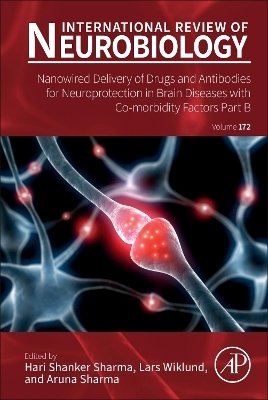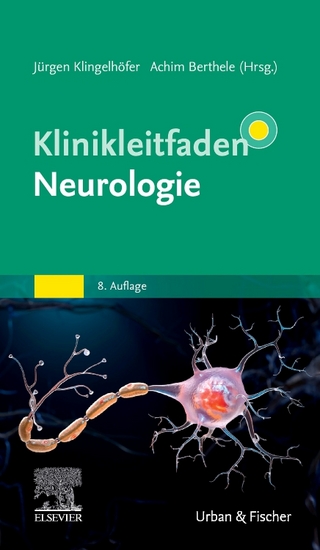
Nanowired Delivery of Drugs and Antibodies for Neuroprotection in Brain Diseases with Co-Morbidity Factors Part B
Academic Press Inc (Verlag)
978-0-443-29468-6 (ISBN)
Other sections cover Efficacy of invasive and non-invasive methods for the treatment of Parkinson´s disease: nanodelivery and enriched environment, Co-administration of DL-3-n-butylphthalide and neprilysin is neuroprotective in Alzheimer disease associated with brain injury, Nicotine Neurotoxicity Exacerbation following Engineered Ag and Cu (50-60 nm) nanoparticles intoxication, and Neuroprotection with nanowired delivery of antioxidant compound H-290/51 together with serotonin 5-HT3 receptor antagonist ondansetron.
Dr. Hari Shanker Sharma, Professor of Neurobiology (MRC), Docent in Neuroanatomy (UU) is currently working in Uppsala University Hospital, Department of Surgical Sciences, Division of Anesthesiology & Intensive Care Medicine, Uppsala University, Sweden. Dr Sharma obtained his Masters Degree from Bihar University with special expertise in Cell Biology in 1976 and was awarded the Gold Medal of Bihar University for securing 1st position in the 1st Class. Dr Sharma joined the group of Professor Prasanta Kumar Dey, a neurophysiologist, by training in the Department of Physiology, Institute of Medical; Sciences, Banaras Hindu University, Varanasi in 1977 to obtain his Doctor of Philosophy Degree (D.Phil.) in Neurosciences and was awarded his Ph.D. in 1982 on “Blood-Brain Barrier in Stress. After carrying out a series of Government of India funded Research Projects on the BBB and brain dysfunction (1982–1987), Dr Sharma joined the lab of Neuropathology at Uppsala University with Professor Yngve Olsson in 1988 to investigate passage of tracer transport across the BBB caused by stress or traumatic insults to the Brain and Spinal cord at light and electron microscopy. Dr Sharma was awarded the prestigious Alexander von Humboldt Foundation Fellowship of German Government (1989–1991) to work on hyperthermia induced BBB dysfunction at the ultrastructural level in the laboratory of Professor Jorge Cervós-Navarro (a living “Legend in Neuropathology in Europe). Dr Sharma again joined Uppsala University and established a network of collaboration on “Experimental CNS Injury Research Group as a lead investigator with eminent collaborators in various parts of Europe, USA, and Australia (1991–). On his work on hyperthermia Dr Sharma received the prestigious Neuroanatomy award “Rönnows Research prize of Uppsala University for “best neuroanatomical research of the year 1996 followed by the Award of the Degree of Doctor of Medical Sciences of Uppsala University in Neuroanatomy in 1999 and selected for the Best Thesis Award of the Medical faculty, “The Hwassers Prize of 1999. On his meticulous works on the Blood Brain barrier and Brain edema (2000–2003) Dr. Sharma earned the prestigious title of “Docent in Neuroanatomy of Medical Faculty, Uppsala University in April 2004. Currently his main research interest is Neuroprotection and Neuroregeneration, in relation to the Blood-brain barrier in stress, trauma, and drugs of abuse in health and disease. Dr. Sharma on his research on brain pathology and neuroprotection in different models received the prestigious award from The Laerdal Foundation of Acute Medicine, Stavanger, Norway, in 2005 followed by Distinguished International Scientists Collaboration Award by National Institute on Drug Abuse (NIDA), Baltimore, MD (2006–2008). His recent work on 5-HT3 receptor mediated neuroprotection in morphine withdrawal induced neurotoxicity won the coveted prize of Best Investigator Award 2008 and Best Scientific Presentation by European Federation of the International Association for Study of Pain (ISAP), and Awarded during their VI Annual Meeting in Lisbon, September 9–12, 2008. His recent research is aimed to find out the role of nanoparticles in Neurodegeneration and Neuroprotection using various treatment strategies that is supported by European Aerospace Research and Development (EOARD), London, UK and US Air Force Research Laboratory, Wright Patterson Air Force Base, Dayton, Oh, USA. On his works on Blood–brain barrier in hypertension and diabetes together with Romanian colleagues, University of Medicine and Pharmacy “Iuliu Hatieganu, Cluj-Napoca, Romania awarded Dr. Sharma with Honorary Doctorate of Medical Sciences in 2009. Dr Sharma’s work over 30 years on the blood-brain barrier and brain edema won him the US Neurosurgeon Dr Anthony Marmarou Award (2011) by the International Brain Edema Society at their 15th Congress in Tokyo, Japan, November 2011. His works on Nanoneuroscience and development of nanomedicine to treat the CNS injuries has won accolades at various Government and International Scotties or Organization across the World. Accordingly Dr Sharma was decorated with the most prestigious Hind Rattan Award 2012 on the eve of Republic Day of India in January 2012 and Mahatma Gandhi Pravasi Gold Medal in October 2012 in House of Lords, London, UK. Dr Sharma was also invited to organize and chair Nanosymposium in Society for Neuroscience meetings in Chicago (2009), San Diego (2010), Washington DC (2011) and New Orleans (2012). Dr Sharma has published over 380 research papers, 75 reviews, 12 monographs, and 70 international book chapters and edited 15 book volumes. Professor Emeritus Lars Wiklund works in the Department of Surgical Sciences, Anaesthesiology and Intensive Care in Uppsala University, Uppsala, Sweden. Aruna Sharma, MD is currently Secretary of Research at Uppsala University Hospital, Uppsala University, Sweden. She obtained her Bachelor of Science in 1971 and trained in Indian Medicine up to 1977 and engaged in medical research from 1978 to 1986 in India on hyperthermia induced brain dysfunction in the lab of Hari Sharma and Prasanta Kumar Dey under University Grants Commission and Indian Council of Medical Research Her main interest is now focused on Indian Medicinal drugs and their effects on the Central Nervous System Function, toxicology, neurorepair and neuroprotection. She is also investigating neurotoxicological profiles of many Ayurvedic traditional drugs with special reference to those containing metal oxide or metal ashes.
Section I: Spinal cord Injury
1. Spinal cord injury induced exacerbation of Alzheimer's disease pathophysiology in the cord is reduced by topical application of nanowired cerebrolysin and antibodies to tumor necrosis factor alpha
Aruna Sharma
2. Nanodelivery of histamine H3 receptor inverse agonist BF-2549 with clobenpropit a H3 receptor antagonist and H4 receptor agonist induced neuroprotection in spinal cord injury is potentiated by antioxidant compound H-290/51
Anca Dana Buzoianu
3. Neuromodulation and quality of life for patient with spasticity after spinal cord injury
Artur Biktimirov
Section II : Neurodegenerative disease
4. Efficacy of invasive and non-invasive methods for the treatment of Parkinson´s disease: nanodelivery and enriched environment
Andreas Vaquero
5. Co-administration of DL-3-n-butylphthalide and neprilysin is neuroprotective in Alzheimer disease associated with brain injury
Zhenguo G Wang
Section III Drugs of Abuse and Neurotoxicity
6. Nicotine Neurotoxicity Exacerbation following Engineered Ag and Cu (50-60 nm) nanoparticles intoxication. Neuroprotection with nanowired delivery of antioxidant compound H-290/51 together with serotonin 5-HT3 receptor antagonist ondansetron
Z Ryan Tian
Section IV: Clinical Neurology and Oncology
7. The technology of genomic balancing the hemopoiesis precursor clones by nucleosome monomers of human genomic DNA (hDNAnmr) and perspectives of clinical use
Andrey Bryukhovetskiy
8. An overview of Twist1 in glioma progression and recurrence;
Zhiqiang Zhang
9. A review of traditional Chinese medicine Curcumae Rhizoma for treatment of glioma.
Cong Li
10. A case of a large lumbar schwannoma from a filum terminal and literature review.
Chao He
| Erscheinungsdatum | 21.10.2023 |
|---|---|
| Reihe/Serie | International Review of Neurobiology |
| Verlagsort | San Diego |
| Sprache | englisch |
| Maße | 152 x 229 mm |
| Gewicht | 450 g |
| Themenwelt | Medizin / Pharmazie ► Medizinische Fachgebiete ► Neurologie |
| Naturwissenschaften ► Biologie ► Humanbiologie | |
| Naturwissenschaften ► Biologie ► Zoologie | |
| ISBN-10 | 0-443-29468-2 / 0443294682 |
| ISBN-13 | 978-0-443-29468-6 / 9780443294686 |
| Zustand | Neuware |
| Informationen gemäß Produktsicherheitsverordnung (GPSR) | |
| Haben Sie eine Frage zum Produkt? |
aus dem Bereich


